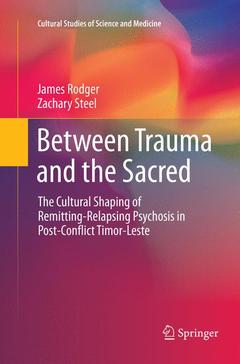Between Trauma and the Sacred, Softcover reprint of the original 1st ed. 2016 The Cultural Shaping of Remitting-Relapsing Psychosis in Post-Conflict Timor-Leste Cultural Studies of Science and Medicine Series

Dr. James Rodger is a Consultant Child and Adolescent Psychiatrist in the United Kingdom National Health Service and an Honorary Associate Research Fellow at the University of Exeter. He holds an additional degree in Medical Anthropology and has undertaken postgraduate training in Systemic Practice. His principle clinical and research interest is the developmental, social and cultural aspects of psychotic phenomena and related implications for intervention. He undertook the key fieldwork forming the basis of this work in 2004, in the context of an 18-month mental health research program in Timor-Leste. In addition Dr Rodger has provided expert evidence relating to transcultural trauma-related psychiatric presentations for both asylum and criminal cases. Previous publications relate to the wider epidemiological research findings and implications from Timor-Leste, to critical-relational challenges to psychiatric practice, and to the anthropology of altered mental states.
Dr. ZacharySteel is a clinical psychologist who holds the St John of God Professorial Chair of Trauma and Mental Health, School of Psychiatry, University of New South Wales and Richmond Hospital, New South Wales, Australia. Dr Steel has developed a program of mental health research across culturally diverse communities and settings with a particular focus on traumatic stress, forced displacement, conflict and culturally specific symptoms of mental disorder and distress. Within the Asia-Pacific region he is involved in collaborative mental health research programs in Vietnam, Aceh-Indonesia, and Timor-Leste as well as with asylum seeker and refugee communities in Australia and amongst Aboriginal communities in Far West New South Wales. His research with asylum seeker populations in Australia has helped to develop an evidence base on the adverse mental health consequences of harsh asylum policies including the use of immigration detention and temporary protectionExplores the relationship between culture, trauma, dissociation and brief–chronic psychotic states, suggesting schemas for culturally sensitive intervention
Includes multiple case histories with extended commentary drawing together disparate work, incorporating agentic and deterministic models
Provides rich quantitative and qualitative data about patterns of mental distress in Timor-Leste, in the context of the nation’s protracted struggle for independence
Includes supplementary material: sn.pub/extras
Date de parution : 04-2018
Ouvrage de 188 p.
15.5x23.5 cm
Date de parution : 03-2016
Ouvrage de 188 p.
15.5x23.5 cm
Disponible chez l'éditeur (délai d'approvisionnement : 15 jours).
Prix indicatif 52,74 €
Ajouter au panier